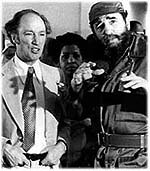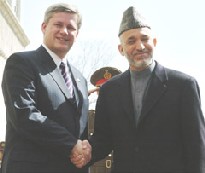 It is with great sadness that I have found out that anarchist theoritician, the author of Listen Marxist, The Limits of the City, etc. Founder of the Social Ecology Movement and anti-Lifestylist/Anti-Post Leftist Anarchism, and general curmodgen of the anarchist movement, Murray Bookchin has passed away.I agreed with Bookchin more than I disagreed with him.
It is with great sadness that I have found out that anarchist theoritician, the author of Listen Marxist, The Limits of the City, etc. Founder of the Social Ecology Movement and anti-Lifestylist/Anti-Post Leftist Anarchism, and general curmodgen of the anarchist movement, Murray Bookchin has passed away.I agreed with Bookchin more than I disagreed with him.
For instance he dared to challenge the tree huggers with this idea; strip mining is better than deep mining. Mining is a horrible experience for workers as we can tell from the amount of mine accidents that occur. Far safer is strip mining. While it looks awful, the fact is that for the workers who mine, it is far more effective and safe. And the land can be reclaimed. While a mine can never be reclaimed. Those who talk about strip mining raping the earth should think about the miles of deep mines that dig into the earth never to be used again for anything expect perhaps for dumping toxic and nuclear waste. Brilliant.
A toast to Murray who will be with us still in his volumous writings. And I hope will continue to influence our movement with his thoughts. Because he remains a real alternative to the dweebs like the Chuck O , Jason McQuinn and the Green Anarchists. They are intellectual fleas and woe betide our movement with them as the next generation of anarchists. Ok everyone back to the books, lets read our Bookchin to get a good grounding in modern anarchist thought.
Here is a biography/eulogy on Murray.
Murray Bookchin, visionary social theorist, dies at 85
Murray Bookchin, the visionary social theorist and activist, died
this Sunday, July 30.
By Brian Tokar
Murray Bookchin, the visionary social theorist and activist, died
during the early morning of Sunday, July 30th in his home in Burlington,
Vermont. During a prolific career of writing, teaching and political
activism that spanned half a century, Bookchin forged a new
anti-authoritarian outlook rooted in ecology, dialectical philosophy and
left libertarianism.
Keywords: Analysis, Global, Political Theory,
Murray Bookchin
Murray Bookchin, the visionary social theorist and activist, died
during the early morning of Sunday, July 30th in his home in Burlington,
Vermont. During a prolific career of writing, teaching and political
activism that spanned half a century, Bookchin forged a new
anti-authoritarian outlook rooted in ecology, dialectical philosophy and
left libertarianism.
During the 1950s and ‘60s, Bookchin built upon the legacies of utopian
social philosophy and critical theory, challenging the primacy of
Marxism on the left and linking contemporary ecological and urban crises
to problems of capital and social hierarchy in general. Beginning in the
mid-sixties, he pioneered a new political and philosophical
synthesis*termed social ecology*that sought to reclaim local
political power, by means of direct popular democracy, against the
consolidation and increasing centralization of the nation state.
From the 1960s to the present, the utopian dimension of Bookchin’s
social ecology inspired several generations of social and ecological
activists, from the pioneering urban ecology movements of the sixties,
to the 1970s’ back-to-the-land, antinuclear, and sustainable technology
movements, the beginnings of Green politics and organic agriculture in
the early 1980s, and the anti-authoritarian global justice movement that
came of age in 1999 in the streets of Seattle. His influence was often
cited by prominent political and social activists throughout the US,
Europe, South America, Turkey, Japan, and beyond.
Even as numerous social movements drew on his ideas, however, Bookchin
remained a relentless critic of the currents in those movements that he
found deeply disturbing, including the New Left’s drift toward
Marxism-Leninism in the late 1960s, tendencies toward mysticism and
misanthropy in the radical environmental movement, and the growing focus
on individualism and personal lifestyles among 1990s anarchists. In the
late 1990s, Bookchin broke with anarchism, the political tradition he
had been most identified with for over 30 years and articulated a new
political vision that he called communalism.
Bookchin was raised in a leftist family in the Bronx during the 1920s
and ‘30s. He enjoyed retelling the story of his expulsion from the Young
Communist League at age 18 for openly criticizing Stalin, his brief
flirtation with Trotskyism as a labor organizer in the foundries of New
Jersey, and his introduction to anarchism by veterans of the immigrant
labor movement during the 1950s. In 1974, he co-founded the Institute
for Social Ecology, along with Dan Chodorkoff, then a graduate student
at Vermont’s Goddard College. For 30 years, the Institute for Social
Ecology has brought thousands of students to Vermont for intensive
educational programs focusing on the theory and praxis of social
ecology. A self-educated scholar and public intellectual, Bookchin
served as a full professor at Ramapo College of New Jersey despite his
own lack of conventional academic credentials.He published more than 20
books and many hundreds of articles during his lifetime, many of which
were
translated into Italian, German, Spanish, Japanese, Turkish and other
languages.
During the 1960s - ‘80s, Bookchin emphasized his fundamental
theoretical break with Marxism, arguing that Marx’s central focus on
economics and class obscured the more profound role of social hierarchy
in the shaping of human history. His anthropological studies affirmed
the role of domination by age, gender and other manifestations of social
power as the antecedents of modern-day economic exploitation. In The
Ecology of Freedom(1982), he examined the parallel legacies of
domination and freedom in human societies, from prehistoric times to the
present, and he later published a four-volume work,The Third Revolution,
exploring anti-authoritarian currents throughout the Western
revolutionary tradition.
At the same time, he criticized the lack of philosophical rigor that
has often plagued the anarchist tradition, and drew theoretical
sustenance from dialectical philosophy*particularly the works of
Aristotle and Hegel; the Frankfurt School*of which he became
increasingly critical in later years*and even the works of Marx and
Lenin. During the past year, even while terminally ill in Burlington,
Bookchin was working toward a re-evaluation of what he perceived as the
historic failure of the 20th century left. He argued that Marxist crisis
theory failed to recognize the inherent flexibility and malleability of
capitalism, and that Marx never saw capitalism in its true contemporary
sense. Until his death, Bookchin asserted that only the ecological
problems created by modern capitalism were of sufficient magnitude to
portend the system’s demise.
Murray Bookchin was diagnosed several months ago with a fatal heart
condition. He will be remembered by his devoted family members*including
his long-time companion Janet Biehl, his former wife Bea Bookchin, his
son, daughter, son-in-law, and granddaughter*as well as his friends,
colleagues and frequent correspondents throughout the world. There will
be a public memorial service in Burlington, Vermont on Sunday, August
13th. For more information, contact info(at)social-ecology.org.
AnarchistsAnarchismRIP/Obitruaries
Find blog posts, photos, events and more off-site about:
anarchy, socilaecology, anarchism, Bookchin, politics, aniti-politics, libertarian, ecology, municipalism, writers, authors, leftwing, anti-authoritarianism,








